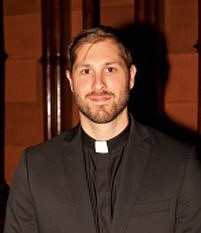November 20, 2019 at 6:13 p.m.
At the beginning of every academic year, the seminary here in Rome reserves a week for each class to enter into a period of prayer and silence in various locations in Italy. During the first two years, the first-year and second-year theologians go on retreat in Greccio, the small town where St. Francis created the first Christmas Crèche. This year, as a third-year theologian, we went to a small town called Rocca di Papa. The first thing I noticed was the garden that surrounded this substantial property. While it wasn’t as vibrant or eclectic as some gardens are in the U.S. or England, like Father Anthony Barratt’s, it was nevertheless beautiful, fragrant and peaceful.
Each day as I walked around this garden, I was reminded of how often Holy Scripture utilizes the image of a garden and a gardener. For example, in the second chapter of the book of Genesis, God is the gardener who plants the Garden in Eden. He places Adam there, and gives him the responsibility to “till” and “keep” the garden. Remarkably, God asks Adam to share in His role as gardener. A role that Adam lost through original sin.
The Gospel of John, which closely mirrors that of the book of Genesis, also features a garden and a gardener. For example, it is often overlooked that Jesus’ tomb was placed within a garden. Additionally, because of this fact, Mary Magdalene mistakes Jesus for the gardener. Finally, various analogies and parables scattered throughout the Old and New Testaments utilize the image of a garden or a gardener; one of the most well-known being that of the Parable of the Sower.
As I pondered over these various images, I found that God’s role in Salvation History can be described as that of the “Constant Gardener.” St. Mary Magdalene’s mistaken identity was, in reality, no mistake at all. Christ is the new Adam, the new gardener, who penetrates the ground, plants the tree of life that is the Cross on Calvary, and waters the barren soil of this fallen world with the precious blood that flows from His most Sacred Heart. The Garden of Eden has bloomed again. The rivers of grace that were barred, have been let loose.
When Mary Magdalene saw Christ after the Resurrection, the work of planting this garden anew had begun. From that time until now, Christ is continuously and carefully “keeping” and “tilling” this new garden; the Garden of the Human Soul. He lovingly and laboriously works to break open the ground of our hard and obstinate hearts. He is constantly watching and watering us with His grace, waiting for the first signs of growth in the life of the Spirit and virtue. And once he sees the slightest sprout, Jesus meticulously works to uproot any weeds of vice and thorns of sin that too often take the lives of His beloved flowers.
Despite such tender and constant care by Jesus Christ, the Constant Gardener, the growth of our souls are dependent upon allowing him to care for us. Just as a flower needs proper soil, and a sufficient amount of sunlight and water to grow, so too do our souls need to be planted in the proper environment and be exposed to those things that give life to the soul; for example, healthy hobbies, good literature, movies and conversations, but most of all the Word of God and the Sacraments. In essence, our souls must be receptive to God. They must be disposed to all he wants to give, because He wants to give us more than “we could ask or imagine (Eph 3:20).”
“God wants to love people into life, into freedom, into a profound friendship.” Yet, continues St. Thérèse, “How few there are who are willing to open their lives to that love.” Here is the cause of God’s pain; namely, our lack of confidence in His love for us. Through our baptism God has planted us in His Garden, and He eagerly awaits our growth into the diverse and lively souls He created us to be. Trusting in his love and care, we must imitate the Rosa Mystica, Our Lady, and give ourselves fully to the Constant Gardener saying “let it be done unto me according to thy word.” When we do this, the Church will truly become the vibrant and fragrant Garden that God intends it to be.
Stephen Yusko is a third-year theology student at North American College in Rome.
- Colorado diocesan-sponsored clergy peer support, resiliency program believed to be first in nation
- Supreme Court temporarily blocks California policy against parental notification of gender identity
- Vatican synod study group proposes creation of pontifical commission for new technologies
- Young Catholics want doctrinal clarity, not adaptability, Irish bishop says
- Church can teach what’s at stake when nations choose war, not peace, cardinal says
- 5 saintly role models we need to help us overcome today’s problems
- Lebanese archbishop: Innocents are ‘paying the price’ of Middle East war
- Honolulu Diocese expands footprint in city’s downtown with purchase of historic building
- Experts: Debates about Zionism, even by Catholics, often at odds with Catholic understanding
- From Algeria to Angola, Africans hope message of peace, dialogue will resonate during papal trip








Comments:
You must login to comment.